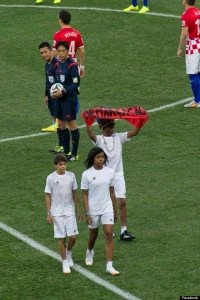My personal ‘best of the best’ Awards to mark the grand finale of the 2014 FIFA-Brazil football competition - and some of the best contributions to this blog:
The outstanding Fair Play Award goes to Caritas Australia for its campaign to get FIFA and the International Olympic Committee to promote justice in its host city selections. As well as its brilliant and comprehensive Sports for Justice report.
Most promising player: 13-year-old Jeguaká Mirim, the indigenous Guarani boy, who, after releasing one of three white doves in the official opening ceremony, held up – unofficially – a land rights banner as he walked off the field.
Goal of the Tournament? The Homeless Workers' Movement’s victory in getting a low-cost housing scheme approved for the 'People's Cup’ site overlooking the Sao Paulo stadium.
The Golden Boot Award - to John Oliver, for ‘putting the boot in’ to FIFA, for its exploitative powers over host countries and poor people.
and finally – very finally – a special post-humous Award for Inspiring Britons - Rik Mayall for his ‘Noble England’ football anthem – even if it didn’t stir England past the group stage. I’ll let him have the last laugh – you can’t argue with the dead:
The outstanding Fair Play Award goes to Caritas Australia for its campaign to get FIFA and the International Olympic Committee to promote justice in its host city selections. As well as its brilliant and comprehensive Sports for Justice report.
 |
| Nelson Almeida/AFP/Getty |
The Golden Boot Award - to John Oliver, for ‘putting the boot in’ to FIFA, for its exploitative powers over host countries and poor people.
and finally – very finally – a special post-humous Award for Inspiring Britons - Rik Mayall for his ‘Noble England’ football anthem – even if it didn’t stir England past the group stage. I’ll let him have the last laugh – you can’t argue with the dead:
And remember - keep your eye on the ball. Though this is probably my last post in this series, keep an eye on my Facebook page for links to post-tournament football social analysis, debates, discussion, dissection, soul-searching and questions to be asked of FIFA and the powers that be. There are many out there calling for change, and social justice in our sporting decisions.









